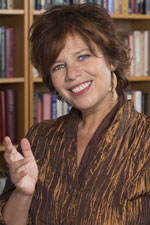Diana Fosha, PhD
Diana Fosha, Ph.D., is the developer of AEDP (Accelerated Experiential Dynamic Psychotherapy), a healing-based, transformation-oriented model of psychotherapeutic treatment; she is Founder and Director of the AEDP Institute. Based in New York City, she has been on the faculties of the Departments of Psychiatry and Psychology of NYU and St. Luke's/Roosevelt Medical Centers (now Mount Sinai) in NYC, and of the doctoral programs in clinical psychology at the Derner Institute for Advanced Psychological Studies and The City University of New York. Diana Fosha is the author of The Transforming Power of Affect: A Model for Accelerated Change (Basic Books, 2000), and of numerous articles on an attachment-emotion-transformation focused experiential treatment model. She is senior editor, with Daniel Siegel and Marion Solomon, of The Healing Power of Emotion: Affective Neuroscience, Development & Clinical Practice (Norton, 2009), part of Norton’s Interpersonal Neurobiology series, and co-author, with Natasha Prenn, of Essentials of AEDP Supervision (APA, 2016). APA has issued 3 DVDs of her APA work. [Learn more and purchase here.]
She has contributed chapters to, among others, Clinical pearls of wisdom: 21 leading therapists offer their key insights, edited by M. Kerman (Norton, 2009); Complex traumatic stress disorders: An evidence-based clinician's guide, edited by C. Courtois & J. D. Ford (Guilford, 2009); Healing trauma: Attachment, mind, body and brain, edited by Marion Solomon and Daniel Siegel (Norton, 2003); and to The comprehensive handbook of psychotherapy, Volume 1: Psychodynamic and object relations therapies, edited by J. J. Magnavita (Wiley, 2002).
Dr. Diana Fosha graduated magna cum laude with a BA in psychology from Barnard College and received her PhD in clinical psychology from the City university of New York (CUNY). For the last 20 years, she has been active in promoting a scientific basis for a healing oriented attachment, emotion and transformation focused therapy.
Known for her powerful, precise yet simultaneously poetic and evocative affective writing style, Diana's phrases --- "undoing aloneness," "existing in the heart and mind of the other," "True Other," "make the implicit explicit and the explicit experiential," "stay with it and stay with me," "rigor without shame" and "judicious self-disclosure" -- capture the ethos of AEDP.

